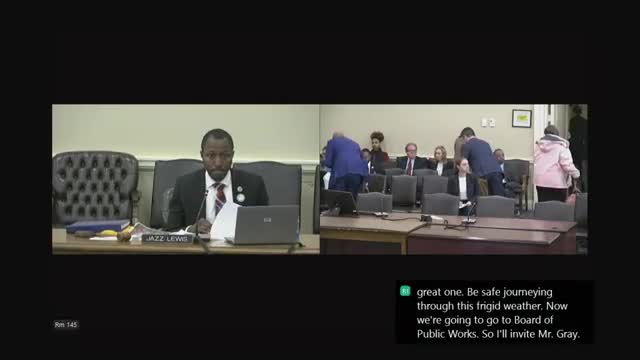Board of Public Works budget hearing spotlights Tree Solutions funding, Chesapeake Bay Trust grants and zoo attendance trends
Get AI-powered insights, summaries, and transcripts
Subscribe
Summary
Analysts briefed the subcommittee on the Board of Public Works' FY26 operating request and pass-through grants including mandated Tree Solutions Now Act funding to the Chesapeake Bay Trust; multiple grantees described program results and the Maryland Zoo explained a recent attendance dip tied to construction and weather.
Mr. Gray presented the Department of Legislative Services analysis of the Board of Public Works (BPW) budget, saying the agency's FY26 operating request "increases by around $800,000 or 2.4 percent to $33,700,000" and that roughly 94% of the board's budget consists of pass-through funding.
Why it matters: the Board of Public Works approves leases, contracts and mandated appropriations and manages several pass-through programs that provide grants to nonprofits and local entities; the hearing focused on where mandated funds will be placed and whether reporting and forecasting are sufficient for future liabilities.
Tree Solutions/Chesapeake Bay Trust: Gray explained a multiyear shift that moves $10 million mandated funding from general funds to the Strategic Energy Investment Fund in FY26 and traced a $2.5 million reallocation in FY25. Casey Wetzel, vice president of programs at the Chesapeake Bay Trust, described the Trust's role administering the Tree Solutions Now Act programs and the Chesapeake Conservation Corps: "So far we have awarded 123 grants totaling $25,800,000 and we've created over a 1000 jobs and supported the planting of 74,000 trees," she said, and warned demand is likely to exceed the governor's FY26 proposal of $10 million.
Maryland Zoo: The DLS analysis flagged a 25.6% decrease in general public attendance and a 7.4% drop in membership attendance in the recent year. Shannon Brown, vice president of strategy and development for the Maryland Zoo, told the committee the largest immediate cause was an $8 million parking-lot renovation in 2023 that removed most on-site parking during construction and deterred visitors; "That is the biggest impact that we saw in fiscal year 24," she said. She also pointed to an unusually rainy spring during peak weekends as a compounding factor and described marketing and event plans to recover attendance.
Erroneously confined payments: Gray also reviewed the state's compensation program for wrongfully convicted individuals and recommended narrative and data reporting to better forecast future liabilities. He noted that funding for these awards is currently a sole state responsibility and that past proposals to require local contributions were not enacted.
Historic Annapolis and regional tourism: Karen Tymer Brown, president and CEO of Historic Annapolis, asked the committee to sustain support for care of 200- to 300-year-old sites that draw roughly 200,000 visitors annually and leverage state funding for preservation and education. Wesley Hines and Mayor Todd Logsdon described the Western Maryland Scenic Railroad's visitor growth (from about 45,000 in 2021 to roughly 80,000 in the most recent year) and its economic contribution to Frostburg and wider Allegany County.
Nonprofit partners: Nancy Hines of the Signal 13 Foundation outlined grants and scholarships to Baltimore Police employees and families and thanked the legislature for prior support; she said the organization distributed scholarships and emergency grants and has implemented payroll deduction among department staff.
Procedural recommendations: DLS suggested reducing the contingent fund by $1.5 million in light of reversion trends and requested continued operational reporting from the Maryland Zoo and data to forecast erroneously confined payments. BPW executive secretary John Gontrom reiterated that pass-through funds comprise the bulk of the board's budget and said the board appreciated the analysis.
Ending: Committee members thanked witnesses and asked for requested reports and follow-up data; no formal votes were taken during the hearing.
